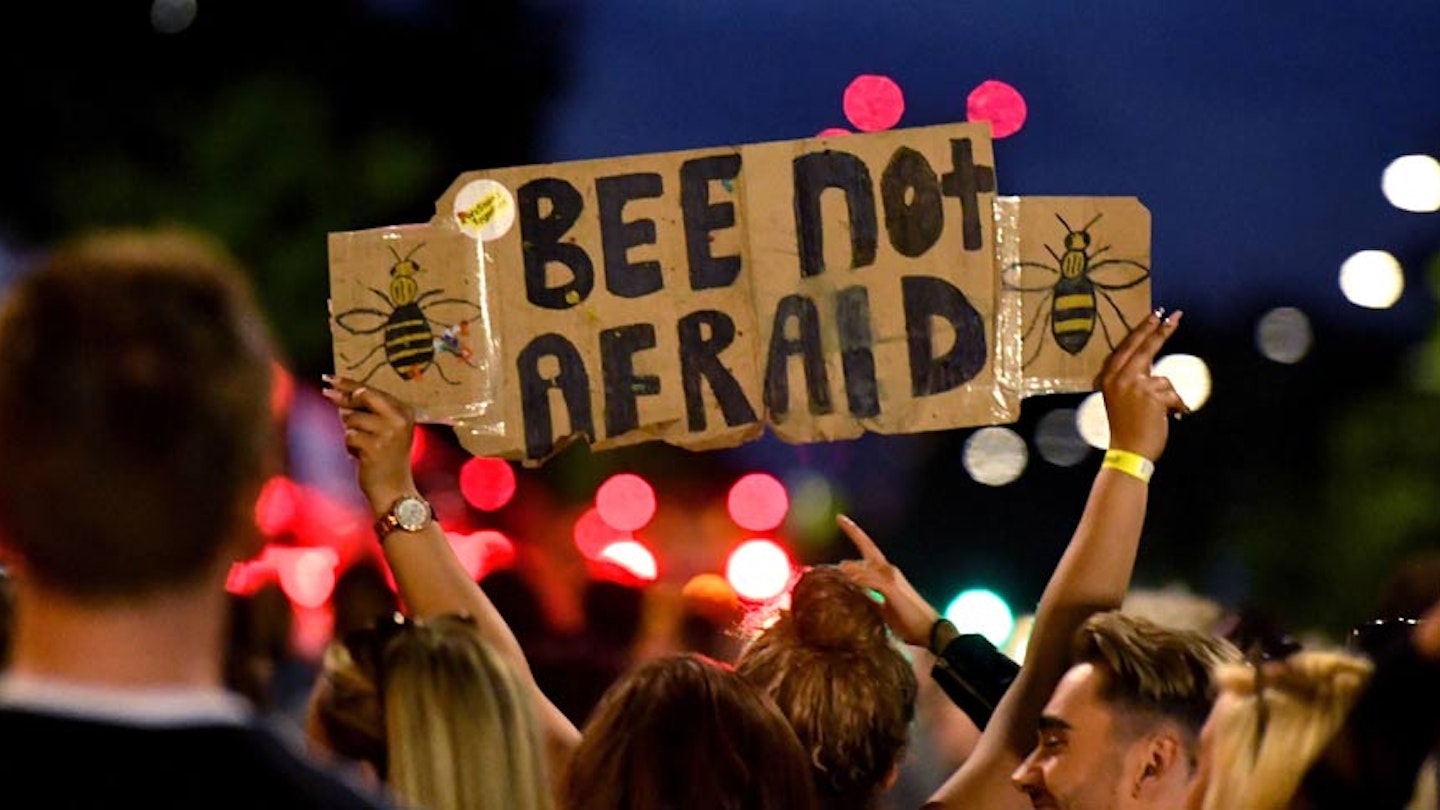When cultural icon and godfather of the city’s prolific music scene Antony H Wilson declared, “This is Manchester, we do things differently here” it stuck. Graffitied on walls in the trendy Northern Quarter and plastered on welcoming billboards at the Airport, the city wears his words as a badge of honour. It has symbolised our instinctive desire to be pioneers, from the industrial revolution to the suffragette movement – fighting for what we believe in and leading the world. On Monday 22nd May and in the trying weeks that followed, it became a verbal comfort blanket that got us through one of the most horrific and testing periods in our history.
At 10.31pm, Salman Abedi, a young man radicalised through YouTube, committed a barbaric and senseless act of violence that claimed the lives of innocent men, women and children; 22 of our friends and neighbours.
I’d finished my evening radio show and returned home to my apartment, just a few hundred yards from the Manchester Arena where American pop star Ariana Grande was in the final song of her concert. My girlfriend and I had just enough time to exchange pleasantries when the thunderous sound of an explosion rumbled through the living room. We took to the balcony, as did the rest of the block, and watched as the usually jubilant sea of concertgoers, making their way home, turned to panic and uncertainty.
I found myself in the lift and down onto the road below. I approached a man and he agreed to talk to me on record as he clutched his daughter under his arm, visibly upset with bunny-ear headwear leaning to one side on her head, innocence violated, clinging on. His first words felt like a punch in the stomach. Suicide bomb. His testimony was calm, almost cold. Smoke. Chemical smell. Corpse. My heart sank into my stomach as I made my way through the crowd. People all too keen to speak on their way. To offload, to convince themselves it wasn’t a dream.
The emergency services fell from the sky in convoys of ambulance and fire crews. Paramedics and passersby a-like tended to the injured. Shrapnel wounds and blooded heads. The scene set around me as fathers comforted mothers, comforting children. I made my way back to our studios for a night of rolling news. The show no presenter ever wants to host.
A long, dark night gave way to sunrise. I stumbled from the studios at 7am and blinked my way into the morning sun. Manchester was quiet and reflective, but it carried on. Commuters hurried to offices and cranes and building sites swung into action – and so too did the benevolence of a city scorned.
Thousands gathered in the town hall square, beneath the beating sun, for a poignant vigil. We cried. We laughed. We embraced our friends and strangers a-like and the on-looking police and paramedics shook a thousand hands. A statement of compassion and community so loud that it echoed through news channels around the world. We decided, that afternoon, that we were to write our own history.
Blood banks overflowed. A group of 12-year-old girls huddled together in the winding queue to donate, determined to help people that could so easily have been them. Hospitals were flooded with food and clothing. Stories of compassion emerged from the night; the taxi drivers ferrying people from the scene for free, the homeless man who rushed into the face of terror to help save the lives of strangers, the pizza company that delivered towers of free pizza to parentless children.
It became impossible to be at an event or in a crowd without the spontaneous breakout of Don’t Look Back in Anger; a song by the Gallagher brothers, two of Manchester’s most famous sons, that became the anthem of defiance.
50,000 people stood shoulder to shoulder with the biggest pop stars in the world at the One Love Manchester concert. Many of them had been there that night, some for their first ever gig. Their uncertainties at being part of a large crowd eclipsed by the desire to sing, live, laugh and love. It is hard, rightly, for us to comprehend what Salman Abedi intended to achieve that night, but I feel certain it wasn’t a police officer dancing with children to Justin Bieber.
We made certain that 22 of our friends and neighbours lost their lives, not in the name of hatred and division, but in the name of peace and solidarity
I will re-run what I saw that night till the day I die, but so too will I run the scenes of compassion and kindness. For us in the north of England, this is who we are. This is Manchester and while people seek to sow division and hatred, we do things differently here…
Darryl Morris hosts the evening show at 7-10pm – listen here, www.planetradio.co.uk.
READ MORE: Tom Hardy Launches A Fundraising Campaign For Victims Of Manchester Attack
